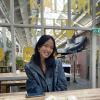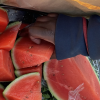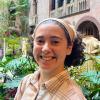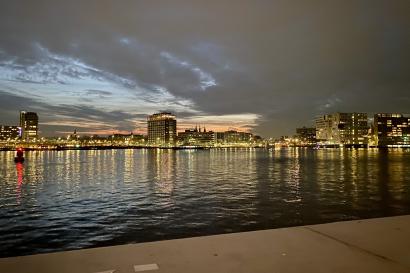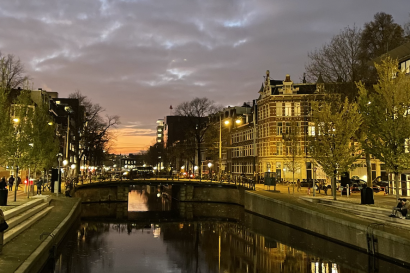
I've finally reached the end of the fall semester, and now I can properly reflect on the experience of attending a Dutch university. I had my last final on Tuesday, a three hour in-person hand written exam about major concepts of migration. Having finals during the last two weeks was a bit disheartening. I was tired from the semester winding down, pre-stressed about packing and flying out, and of course the thought of saying goodbye to everyone brought an onset of bittersweet sadness and sentiment. But I was temporarily exhilarated by the feeling of walking up to my professor and handing in my exam, and him wishing me “Happy holidays!” in a hushed voice with a big smile. Fall semester at UVA over, just like that.
I don’t think my schedule will ever be as perfect as it was this semester. I know I lucked out having both Mondays and Fridays off during Block 2, the second half of the semester. It was just what I needed to feel like I could balance travelling, hanging out with friends, and work. I’m very prone to spending weekends only doing homework, constantly convincing myself into thinking I’m getting ahead and giving myself future free time, which is never the case because I only end up working myself into a hole. One thing I noticed and discussed once I got to know other international students was that faculty (the faculty I had the privilege of having) but especially students prioritized time off, well-being, and rest. In the air there was less of a sense of constant grind. Students were stressed and rushed, and by no means did I find Dutch university to be “easier” relative to American college. It was challenging in a different way, but I think I was more prepared for it than I considered myself to be.
My favorite class at UVA was Introduction to Migration Studies with Hein de Haas. The course ran through both blocks, so I’ll be talking mostly about this class because I’m truly grateful for everything I got out of it. It changed my outlook on people and the world and the greater social, political, economic, and cultural forces at work in our society. I felt like I was directly engaging with the world by just attending his lectures and participating in the seminars.
At first, I was so intimidated by the Europeans in my class. I was one of three Americans in the lecture, and the only American in my seminar when he split the class in two, and I felt it. Any moment America would become relevant to conversation, my professor would often defer to one of the three of us and ask our opinions. He was such a wonderful professor and good person, the most passionate about migration and eager to learn what we all had to say. He was humble too, and welcomed being corrected or challenged. Still, I felt acutely American in a room of Dutch, Polish, German, British, Swedish students. All the Europeans seemed so put together, confident, appeared to know how to carry themselves in a class of international students. Additionally, a lot of the students in the class were strictly sociology majors who had only ever taken social science classes up to that point. This also meant that most of them knew each other from shared classes and majors, and most of them were in joint migration courses that I wasn’t a part of because of the nature of the exchange program. But as I got more comfortable with my classmates, especially the wonderful people in my seminar, I realized, feeling somewhat naive, they’re students in university just like me. I needed to quickly get out of my head that they all knew what they were doing just because they were European. When I got close to two of my friends, one German and the other from the UK, I learned they had their own troubles adjusting to the Dutch university system. In conversation with Dutch students, I learned that their unique struggle was taking a class taught in English. Some weren’t confident enough in their English in an academic setting to contribute to discussion, or there were some over complicated, academic English terms that were difficult to understand. I tried to imagine what that would feel like, if my professor walked up to the podium and started talking in another language where I could only understand bits and pieces, and other students in the class understood completely. Realizing this, I developed an ambivalent stance towards the fact that English is my only language. I admired a lot of my European friends for knowing multiple languages, the average usually being 2 or 3. I think there’s a lot of benefit to knowing multiple languages, and I wish I wasn’t monolingual. I know English is the dominant language of academics, and as a writer and student, I know I enjoy the ability to readily understand and comprehend complex concepts, learn new terminology. Sometimes if their English faltered as we chatted during break, they would ask me to step in and help them find the right word so the conversation could continue. One of my friends told me his conversational English is just fine, but when it came to writing essays or responding in class, they were much less confident. I never considered how English being my native and only language could be a type of privilege.
Fortunately, my professor was so understanding. He often encouraged the Dutch students to participate by offering to translate their responses if they wanted to speak in Dutch. The in-person class essays were allowed to be written in English, Dutch, and, according to the university itself, also French and German. There were times in the seminar, after a particularly long, complex and conceptual tangent, my professor would remark something in Dutch and the Dutch students in the room would laugh, and I would sense them relax a bit.
Another thing that I had to get used to was the grading system, which was explained to me by numerous people, students and faculty, but was still baffling to me by the end. The scale is from 1 to 10, 1 being the lowest and 10 apparently being “reserved for God”. I understood it that a 10 is impossible, a 9 is nearly impossible. 5.5 is passing, the equivalent in my head to a C. Anywhere between 6 and 8 is the sweet spot, the range of an A to a B. My only thing with this grading system was how subjective it seemed; what’s the difference between a 7.3 and a 7.4, and would that difference be up to the professor? This is just how I understood the grading scale for myself, but it seemed everyone had different understandings of what they considered to be a good grade or not.
Sarah Lawrence is a writing college, and I’m studying literature, so most of my classes are very reading heavy, all about analysis and comprehension. Before coming to UVA, I hadn’t taken a proper “exam” since senior year (and my senior year was cut short thanks to Covid, so I didn’t even have real final tests my last year of high school). I’ve been writing 20 page essays since freshman year, and personally I much prefer getting a week to write a paper responding to a known prompt than taking a timed written test. My hand always cramps, I lose momentum by the third question, and sometimes I think I won’t be able to handle the nerves right before entering the exam room, worrying about performance anxiety or that silent, tense atmosphere. But to each their own. I will say that this course in particular was structured in a way I understood what I needed to know for the midterm and final; the stressful part was the sheer amount of information I felt I needed to absorb or memorize. Also coming from Sarah Lawrence, where grades are suggestive and personal evaluations are everything, I needed to relearn what the stakes of what it really meant when the syllabus said the final was 35% of my grade.
Introduction to Migration Studies was a rigorous, intense, pretty involved course. What lessened its intensity was the fact that I thoroughly enjoyed and looked forward to every lecture and seminar. I knew I’d walk away with an expanded perspective. I raved about this course with all my friends, both in class and outside; it changed my world, literally. If at all possible, take Introduction to Migrant Studies with Hein de Haas in your academic career.
Overall, it is hard to say whether or not Dutch university is harder or easier than American college. Of course, it is all relative to your home school, your field of study that determines what courses you enroll in. But there is something intangible about attending international university, walking over that bridge that passes under the giant social sciences building, meeting students from all over the world, and having it dawn on you every morning when you arrive on campus or in the evening when you descend the metro to commute home that you're studying in Amsterdam, and this is a once in a lifetime opportunity you'll never forget.
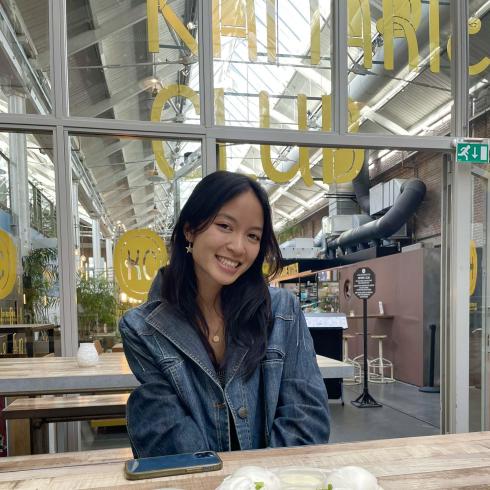
Emma Basco
My name is Emma Basco and I am originally from Sacramento, California. I am currently studying literature and writing at Sarah Lawrence College in New York. I love to read on the beach, doodle on post it notes, paint with watercolors, and unearth new cafes and restaurants. My hidden talent is that I can make an excellent pot of noodles from packaged ramen.

